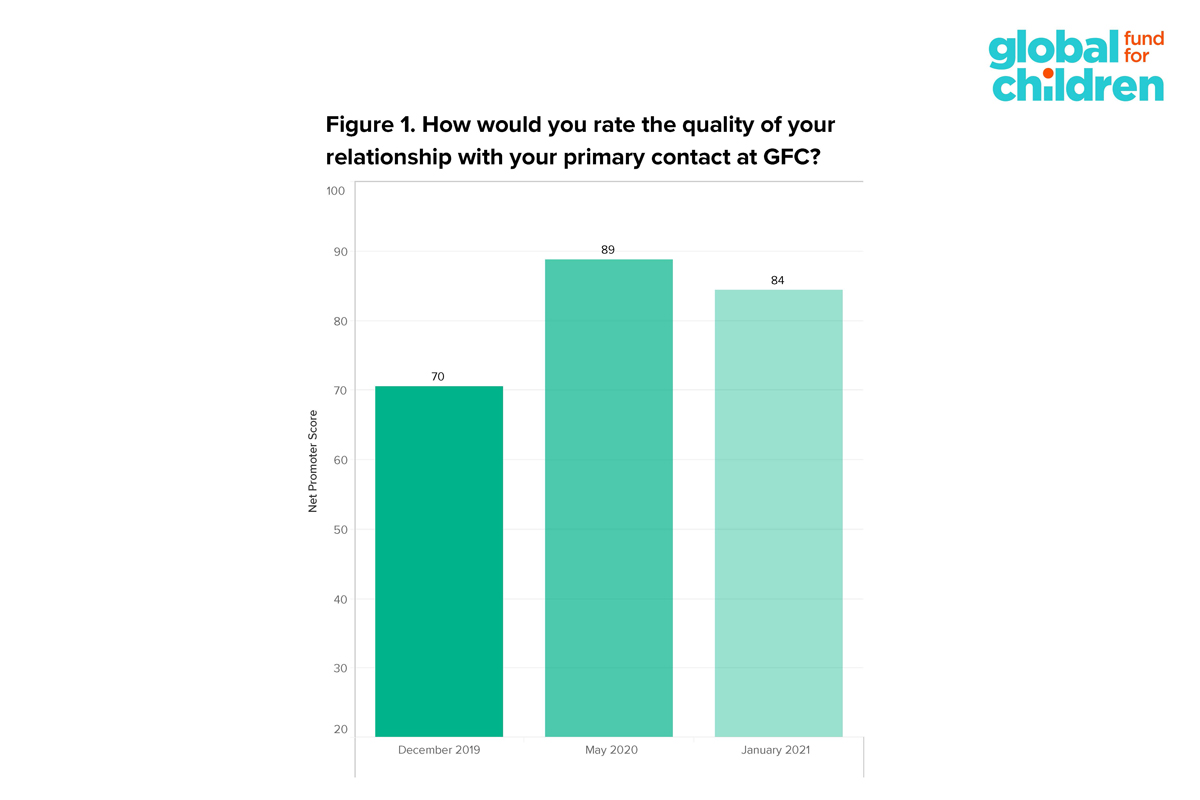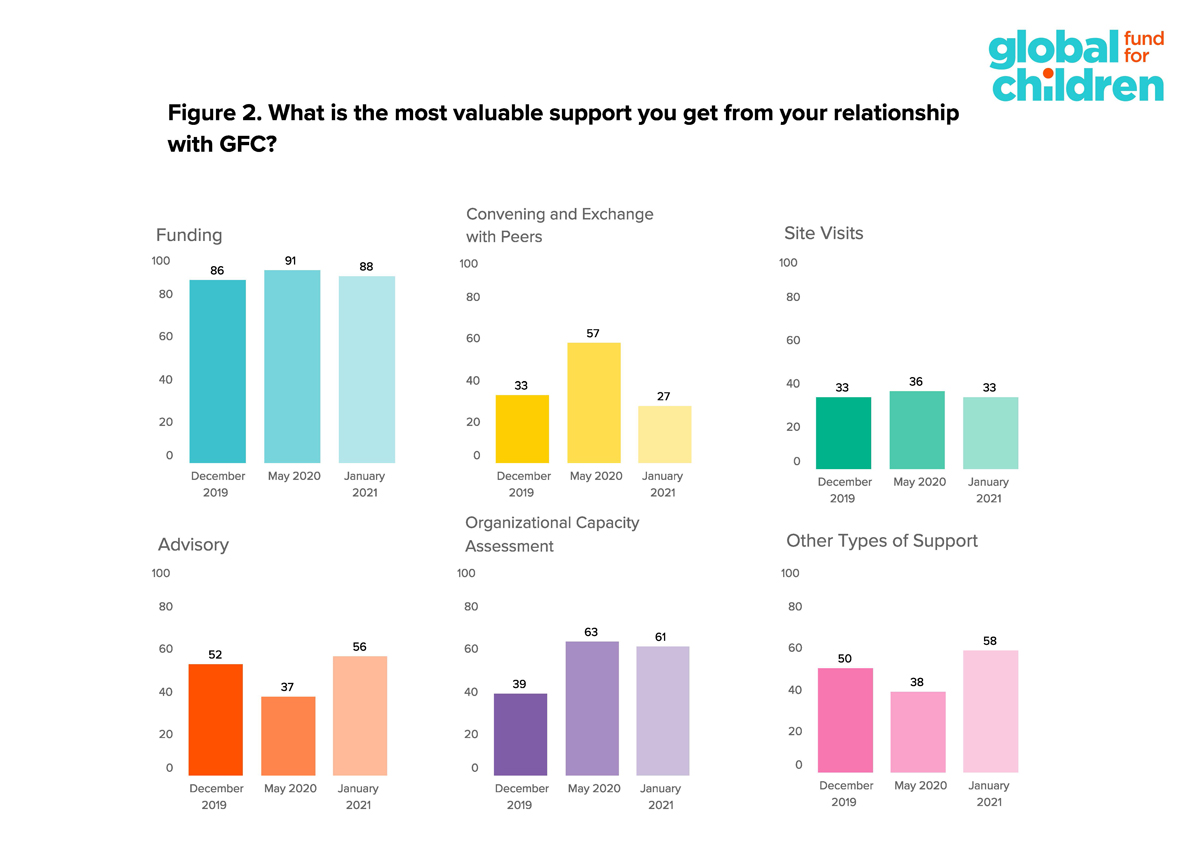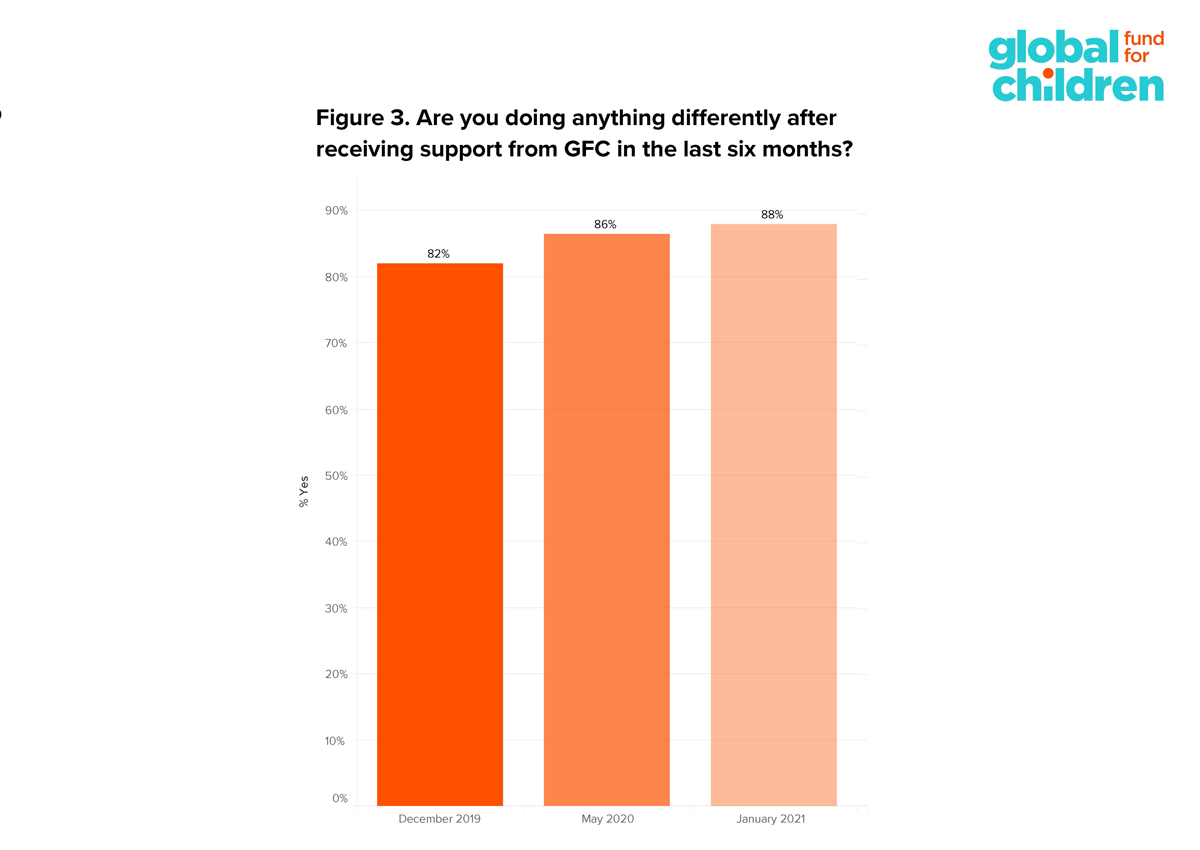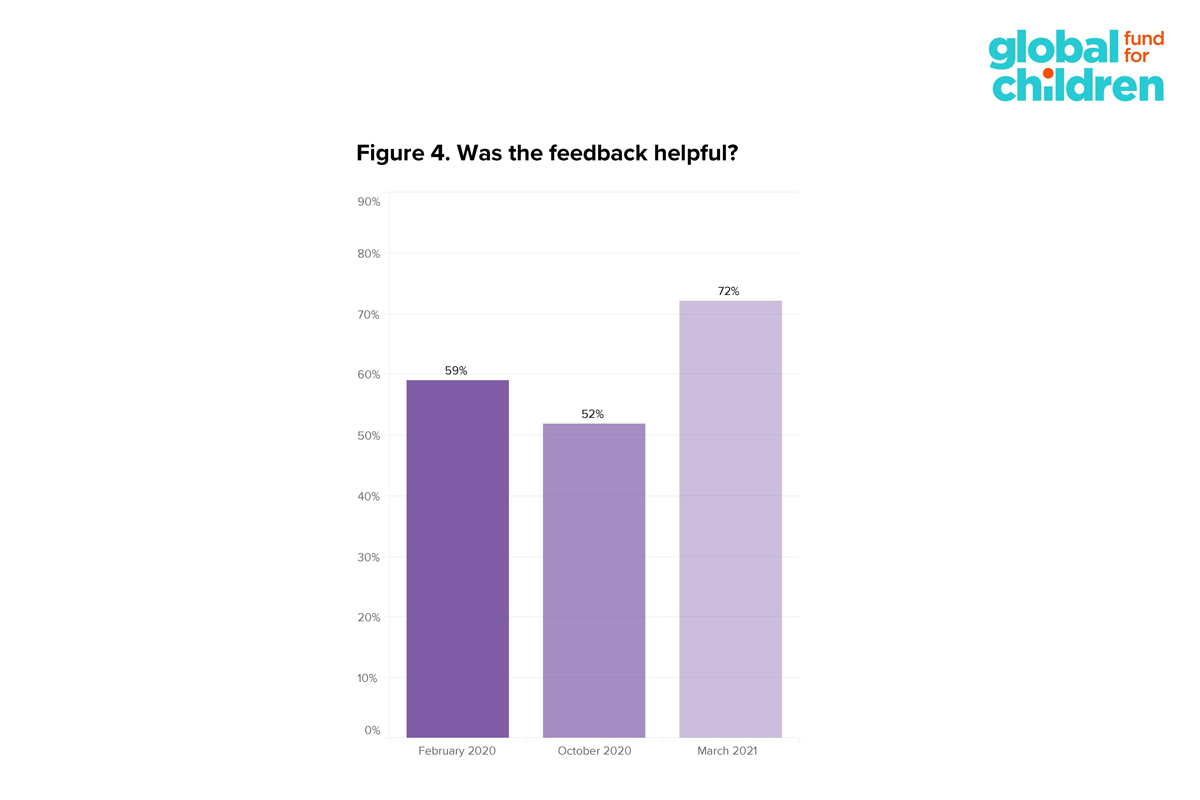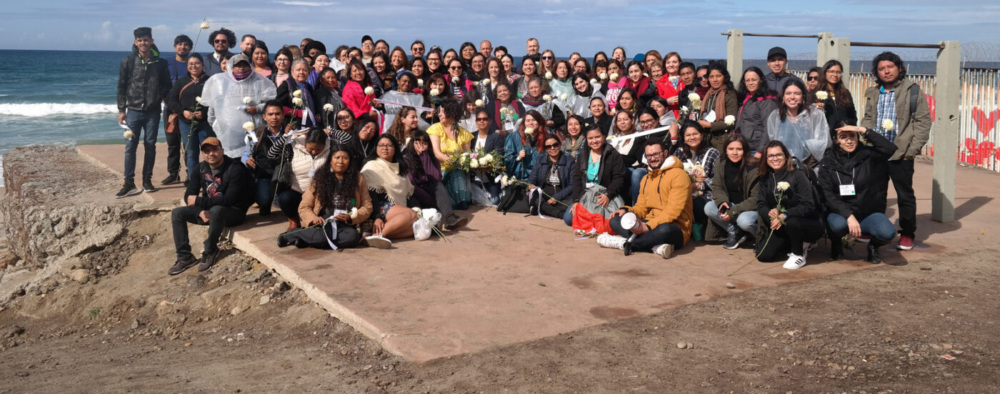
Learning from our partners [special feature]
This special feature was written by Strategic Learning and Evaluation Manager Liza Yanovich and Learning and Evaluation Fellow Sam Phillips-Corwin
GFC launched the Constituent Voice methodology in 2019 to solicit feedback from local partners. They told us about how they view their relationship with GFC and the types of support they find most valuable.
After participating in a Grantee Perception Survey for the first time in 2018, Global Fund for Children decided it was important to get more regular feedback from our community-based partners. Soliciting their input and incorporating it into our work allows us to learn, improve our grantmaking, strengthen our relationships, and build trust.
In 2019, we launched the Constituent Voice methodology through two biannual surveys of our partners. We asked them about their relationships with us, our support, our feedback, and the reporting process. The results show that many of our partners now find us more consistent, reliable, and effective than they did in 2018.
In a survey round conducted in January 2021, for example, GFC’s partners scored the organization at 97 out of 100 for whether it follows through on its commitments, up from 84 in December 2019. While partners also gave us some ideas for how we can continue to grow, the survey results show that we’ve made considerable progress.
In this special feature, GFC shares an overview of the feedback from partners, how we are using it to make changes, and our plans for the future.
Click on the links below to jump to different topics within the report:
- Context: learn about why GFC decided to get more regular feedback
- Methodology: see how GFC conducted the surveys and analyzed the results
- Our findings: find out what we learned from our partners
- Looking ahead: learn about how we plan to integrate our partners’ feedback into our work
Context
At GFC, we value listening. We believe that building strong, trusting relationships depends on how well we listen – and the actions we take based on what we hear from the community-based organizations we support. In 2018, when we received the results of our first Grantee Perception Survey, which was conducted by the Center for Effective Philanthropy, we realized that we needed to become better at listening to and communicating with our community-based partners around the world.
[image_caption caption=”Amé Atsu David (center in dark blue), GFC’s Regional Capacity Development Specialist for West Africa, poses for a picture with partners. © CFN” float=””]
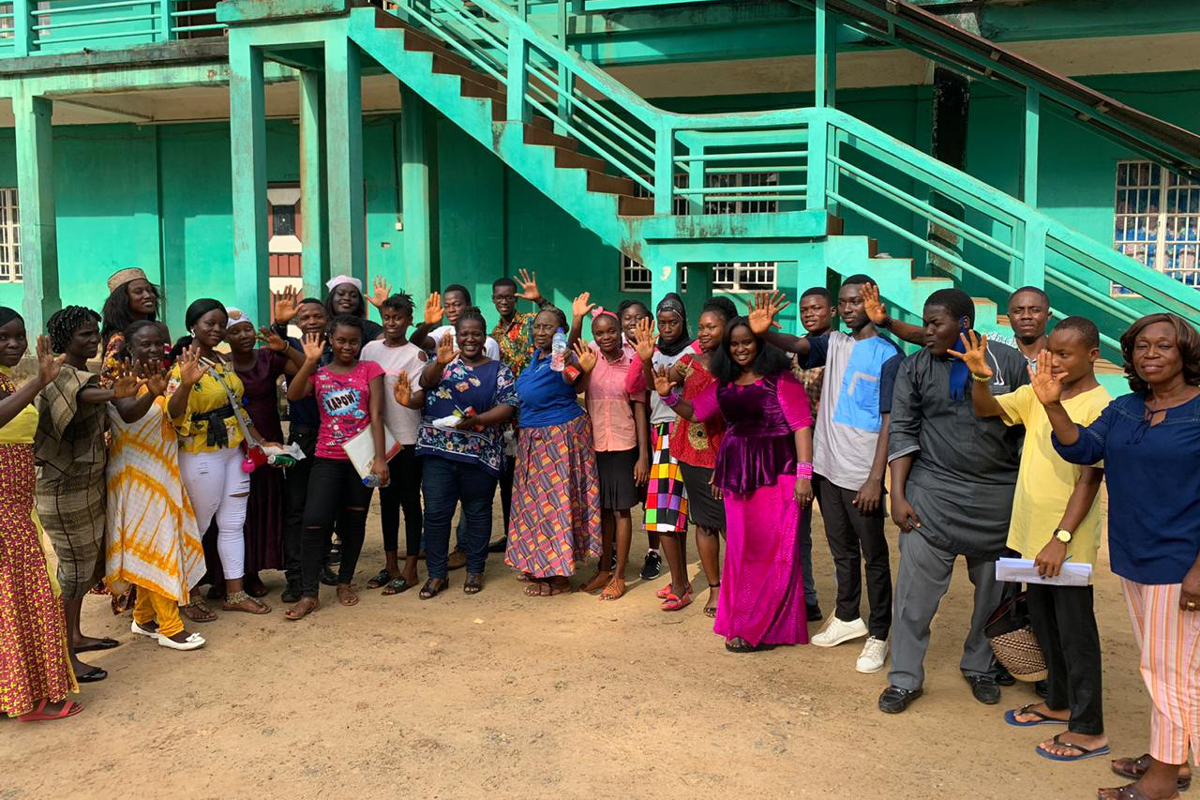
[/image_caption]
Among other things, the 2018 survey told us that we could do more to improve communication, build stronger relationships with our partners, and enhance historical record keeping of important interactions and the evolution of those relationships.
Many things have changed at GFC since 2018: there is greater harmony and less turnover within the team, leading to stronger partner relationships; there is more consistent and documented communication between staff and partners; and GFC works more collaboratively with partners to provide networking and hands-on support. These are just some of the reasons we are able to confidently say that our relationships with our partners are deeper today than they were four years ago.
Methodology
One of the steps we took after the 2018 Grantee Perception Survey was to introduce the Constituent Voice methodology to gain more granular-level feedback from our community-based partners. Keystone Accountability developed the Constituent Voice methodology to allow organizations dedicated to social issues to strengthen their work by improving relationships with their constituents.
A variety of organizations use the Constituent Voice methodology, including governments and businesses. It can play a particularly important role in grantee-funder relationships because of its ability to challenge traditional power dynamics. This methodology can serve as a mechanism to break down some of those dynamics and, when thoughtfully executed and backed up by intentional trust building, generate honest feedback for a funder to make changes.
One of the tools the Constituent Voice methodology offers is the Net Promoter Score, a measurement tool that is used across different industries to help interpret constituent feedback. The Net Promoter Score is calculated by taking the percentage of respondents who rated a given question very highly and subtracting the percentage of respondents who gave it a low rating.
[image_caption caption=”GFC Program Manager Rodrigo Barraza meeting with children in Chiapas, Mexico. © GFC” float=””]
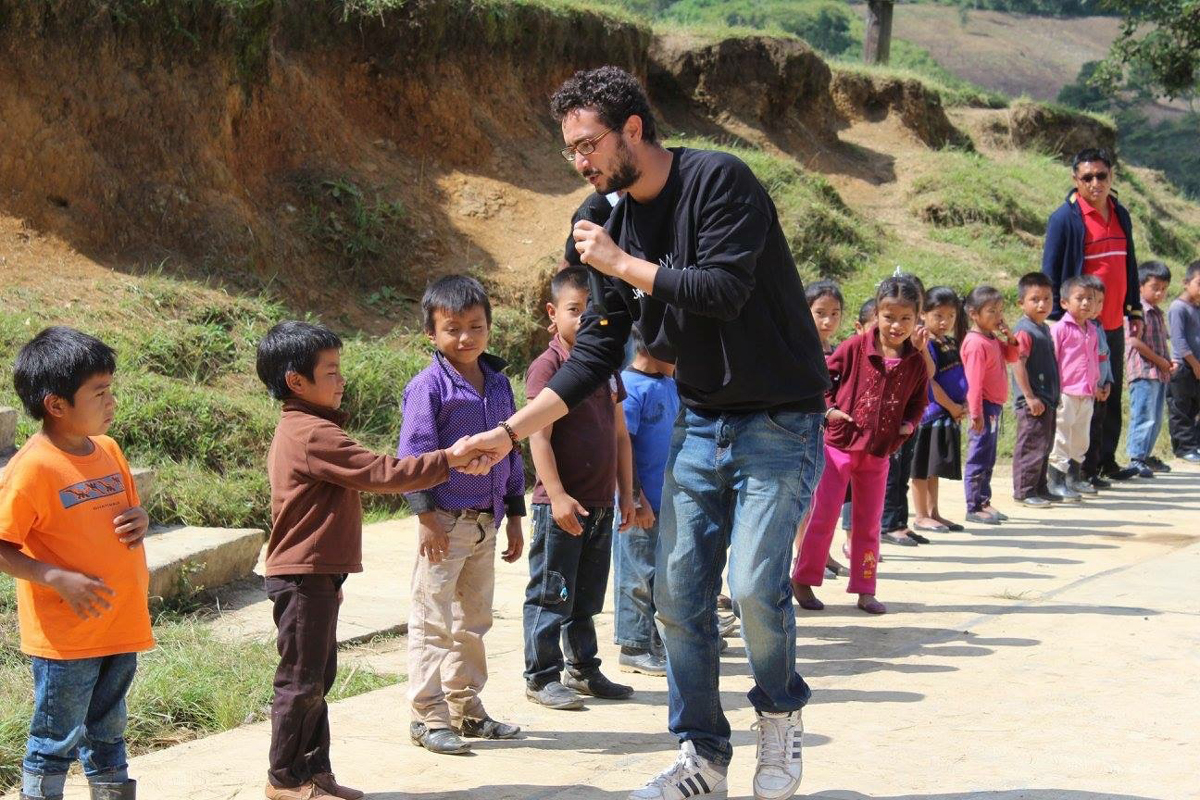
[/image_caption]
Between December 2019 and February 2020, we launched two anonymous Constituent Voice surveys.
The Main Partner Survey focused on asking our partners to share whether GFC is reliable as a funder and partner; the quality of their relationship with GFC; their opinions on the most valuable types of support GFC provides; and the ways GFC’s support is helping them make changes in their work.
The Final Report Survey gave partners the opportunity to provide input on the reporting process at GFC; to consider the appropriateness of the grant amount versus the time it takes to complete a report; and to voice their opinions on the importance of receiving feedback from GFC.
We have now surveyed three separate cohorts of partners for both Constituent Voice surveys. The Main Partner Survey was conducted in December 2019, May 2020, and January 2021. The Final Report Survey was conducted in February 2020, October 2020, and March 2021. The surveys were offered in English, Spanish, and French, and partners completed them through a SurveyMonkey link. The average response rates were 72% for the Main Partner Survey and 55% for the Final Report Survey. The GFC team analyzed the data in Microsoft Excel and Tableau. We are excited to share the results with you.
Our findings
When looking at all three rounds of the Main Partner and Final Report Surveys together, we saw a significant increase in the Net Promoter Score for central questions on GFC’s relationship with its community-based partners. Specifically, these questions were about GFC’s dependability and availability, its impact on partners’ work, and reporting requirements and subsequent feedback from GFC.
In the Main Partner Survey, the overwhelming majority of respondents agreed that GFC follows through on its commitments. For the question, “Does GFC do what it says it will do?”, responses yielded a Net Promoter Score of 84 for both the December 2019 and May 2020 survey rounds. The Net Promoter Score for this question jumped to 97 in January 2021. As we continue to learn and strive to improve the ways in which we support our partners, we celebrate this progress.
“I would go even further: GFC does even more than it says it will.” – GFC partner (December 2019)
In the Final Report Survey, most of the questions about partners’ experiences with GFC’s reporting process received an increasing Net Promoter Score across the three survey rounds. In March 2021 – the third and final round – the Net Promoter Score for all questions on the Final Report Survey fell between 70 and 85.
Building stronger relationships
Building strong, trusting relationships with partners is one of GFC’s central aims. When, in 2018, we learned through the Grantee Perception Survey that many partners did not view their GFC contacts as approachable or consistent communicators, we made a commitment to turn that around.
Three years later, the results of the Main Partner Survey show a noteworthy improvement in the strength of our partner relationships. When asked to rate the quality of the relationship with their primary contact at GFC, participants’ responses showed the Net Promoter Score increasing from 70 in December 2019 to 89 in May 2020, and landing at 84 in January 2021 (see Figure 1).
The higher Net Promoter Scores in May 2020 and January 2021 may be a testament to our efforts to be more present and supportive for our partners during the COVID-19 pandemic. They can also be seen as a result of the larger changes GFC has been making to adopt a values-based approach to communication, improve consistency in documenting interactions, and engage with partners on a deeper level.
When asked to comment on their relationship with GFC, 93% of the respondents across the three survey rounds gave positive feedback.
[image_caption caption=”Kulsoom Khan (second from right), GFC’s Senior Regional Director for Asia, visits a classroom during a trip to see GFC partners in Thailand. © GFC” float=””]
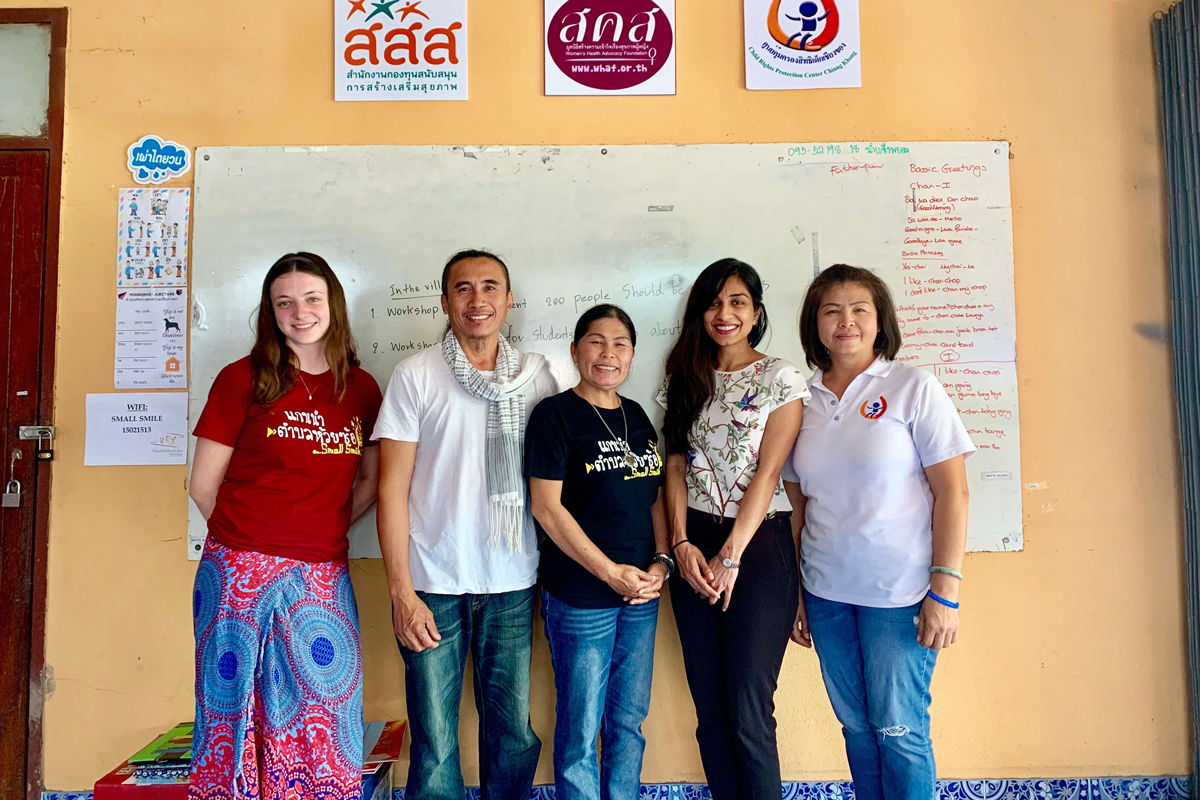
[/image_caption]
“GFC really are partners, not just funders. And that makes so much difference – I really feel they care and that they understand the issues we seek to address.” – GFC partner (December 2019)
We strengthened our relationships with partners not only as a response to our 2018 survey results, but also because of a deeper strategic shift toward philanthropy centered on trust-based relationships built upon equity, humility, and transparency. Early in 2020, GFC became a partner of the Trust-Based Philanthropy Project, which sees strengthening trust as one of the fundamental first steps to meaningfully altering the power imbalance between funders and grantees.
The support offered by GFC
The Main Partner Survey found that our partners’ opinions of different types of GFC support changed over time. This was particularly noticeable in the May 2020 survey.
GFC supports partners in several ways, from flexible funding and advisory services to facilitating convenings – meetings between GFC and local partners – and engaging partners in conversations around their organizational capacities.
Unsurprisingly, funding consistently ranked as the most valuable type of support in all three survey rounds, with an average Net Promoter Score of 88. This was followed by organizational capacity assessments at 54 and advisory support at 48.
While convenings were not highly ranked overall, with an average Net Promoter Score of 39 across the three survey rounds, their Net Promoter Score spiked to 57 in May 2020 (see Figure 2). This round was conducted when many of our partners were making significant adjustments to their programming to respond to the urgent needs created by the COVID-19 pandemic. GFC was adapting as well by offering emergency grants and organizing frequent check-ins to support partners.
A similar jump occurred for the Net Promoter Score for organizational capacity assessments facilitated by GFC: from 39 in December 2019 to 63 in May 2020 and 61 in January 2021. These numbers may reflect the urgent need during the early months of the pandemic for organizations to assess their ability to shift into new types of programming and operate in an uncertain climate on a potentially reduced budget.
In contrast, GFC’s advisory support received a decrease in score in May 2020. Its Net Promoter Score dropped from 52 in December 2019 to 37 in May 2020. The dip may reflect canceled in-person visits during the early stages of the pandemic, as well as the initial discomfort and difficulty of shifting to online communication. By January 2021, the Net Promoter Score for advisory support had increased to 56. By this time, GFC and its partners had adapted to virtual communication, which helps explain why the score rose back up.
Respondents also took the opportunity to emphasize specific instances of support that were helpful to them, such as peer-to-peer connections facilitated by GFC and institutional strengthening through GFC’s Step Up initiative.
“The Cohort team is working very well, and we meet through virtual meetings organized by GFC which is very good learning for us.” – GFC partner (January 2021)
“The Step Up experience has been very useful for personal training and has also contributed to institutional strengthening.” – GFC partner (December 2019)
“Advising in other important areas [was very valuable]. Example: safeguard policy, resource management advice.” – GFC partner (December 2019)
Changing and growing
The Main Partner Survey found that partners had changed or improved something at their organizations after receiving support from GFC. The question, “Are you doing anything differently after receiving support from GFC in the last six months?” received more positive responses over time, which increased from 82% in December 2019 to 88% in January 2021 (see Figure 3).
Partner comments revealed that many of these changes took place in areas like organizational and technical capacities; programming; and monitoring, evaluation, and learning (MEL):
“We are creating a formalized model of our work that can be replicated and investing more heavily in the leadership of our organization thanks to a recent award.” – GFC partner (December 2019)
“We have created a safeguarding policy, have reacted to COVID-19, and are learning how to switch our efforts to virtual spaces.” – GFC partner (May 2020)
“We have improved our organizational financial systems and program design, networking and collaborating with other GFC grassroots partners from around the world, [and] learned self-care and wellbeing practices and incorporated [them into] organizational culture.” – GFC partner (May 2020)
[image_caption caption=”Joseph Bednarek, GFC’s Senior Director of Global Grantmaking, meeting with GFC partner Institute for Rural Initiatives and young people in Moldova. © GFC” float=””]
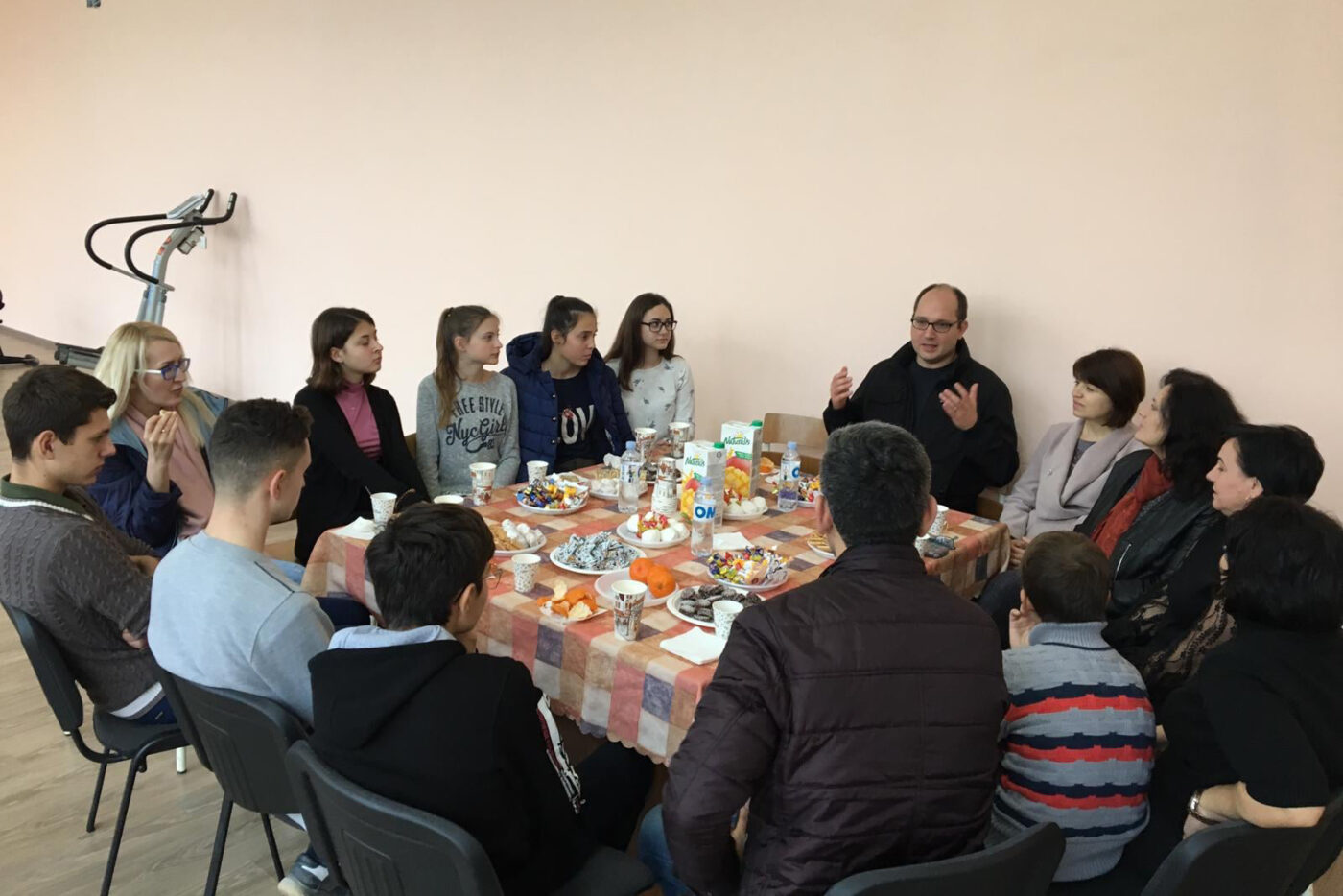
[/image_caption]
The reporting process at GFC
Questions about the clarity, flow, and required effort of the reporting process for partners saw a significant increase in Net Promoter Score across the three rounds of the Final Report Survey. The reporting process at GFC is shaped by each regional team independently, although GFC leaders provide strategic direction. The positive trend can be attributed to the efforts of each of our regional teams to continually improve the reporting processes and experiences of partner organizations, as well as the strategic shifts at GFC as a whole.
Only the question on the time it takes to complete the final report showed a decreasing score. This question was still rated highly, however, starting at 82 in February 2020 and decreasing to 76 by March 2021.
These figures leave room for improvement, but they also show the success of the changes the regional teams have made to simplify their reporting processes over the past few years.
“I really appreciate the simplicity of the reporting format and also the support from the team at GFC.” – GFC partner (February 2020)
“The final report is very basic and adequate, it is one of the reports that our organization makes with pleasure.” – GFC partner (October 2020)
Some respondents also wrote suggestions for how we can improve our reporting process. These included: creating a space to insert pictures in the report; formalizing the post-report feedback process; accepting reports via email; shortening reporting questions and making them more specific; and sending reminders that reports are due.
Getting feedback from GFC
Perhaps the most important finding from the three rounds of the Final Report Survey was the value partners placed on receiving feedback from GFC after submitting their reports. While not all partners received feedback, those who did rated it highly.
This was particularly true in the March 2021 survey round, in which 72% of respondents answered “Yes” to the question, “Was the feedback helpful?” (see Figure 4). This result indicates that it is important for GFC to provide feedback to its partners more consistently. GFC’s work to improve the reporting process – an intentional effort in response to the February 2020 Final Report Survey results – produced a significant increase in the percentage of partners who had received feedback from GFC by the final round and who found it useful. This number jumped from 56% and 55% in the first two rounds to 72% in March 2021.
According to comments, respondents felt that the feedback provided clarity on expectations, created space to think about organizational changes and improvements, enhanced programming and reporting, and strengthened their relationship with GFC.
“The feedback gave us some really good insights which will continually help us to improve on our programing areas and reporting skills.” – GFC partner (February 2020)
“[Once or twice], the Program Officer prepared specific follow up questions and pointers about the report. It was really helpful, and we think it would be good to formalize the process.” – GFC partner (October 2020)
“It was useful because […] I learned that GFC is not only interested in the number of beneficiaries the project supports but also what we have achieved with our beneficiaries as an organization.” – GFC partner (February 2020)
Providing partners with feedback on a completed report directly contributes to the broader goal of building healthy relationships with them. It is therefore not surprising that partners reported significant growth in GFC’s efforts to provide feedback at the same time as they reported improvements in the quality of their relationship with their GFC contacts, as seen in the Main Partner Survey findings.
Looking ahead
In 2018, we administered the Grantee Perception Survey and saw in our partners’ responses several areas for improvement. The survey results reinforced our growing awareness that GFC needed to invest more in its relationships with its partners.
In response, we prioritized building quality, trust-based relationships with our partners; simplified the reporting process; and worked to build our capacity to provide nonfinancial support. Three years later, we are pleased to see that the most recent rounds of the Main Partner Survey and the Final Report Survey confirm the importance of these changes and show significant improvement in our relationships.
[image_caption caption=”GFC Program Officer Bundie Kabanze speaking with girls at the Kamae Girls Borstal Institution during a visit to GFC partner Youth Safety Awareness Initiative in Kenya. © GFC” float=””]
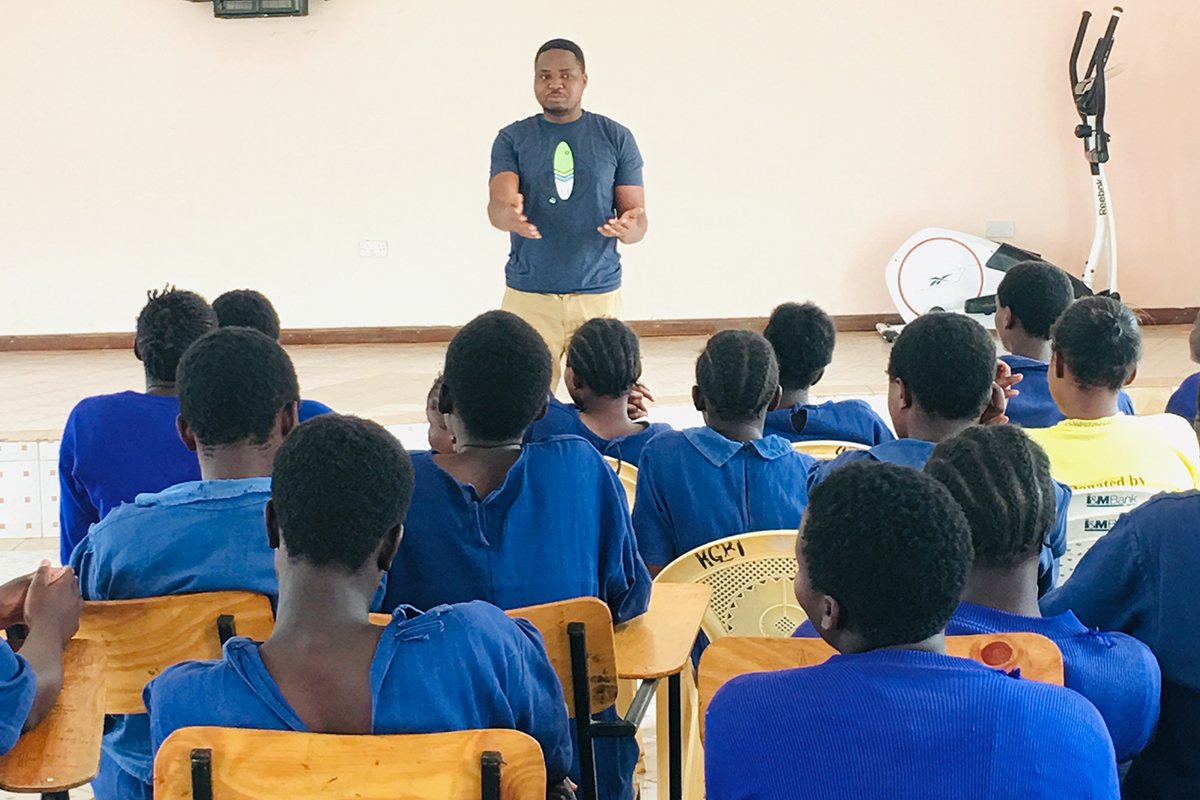
[/image_caption]
We have also learned more about the impact a global health crisis can have on our relationships with our partners and on their needs. As was the case for many others in the philanthropy field, the last 17 months for GFC have been a lesson in listening, flexibility, and quick adaptation. Improving the ways we engage with our partners and how intently we listen to them has allowed us to be more responsive than ever before.
Two of the Constituent Voice survey rounds overlapped with the most difficult period in recent history. This context made it more meaningful to receive overwhelmingly positive feedback from our partners. Their responses show that GFC is on the right track, has made significant progress since 2018, and has areas where it can continue to improve.
We are always grateful to our partners for showing us where we have room for growth. As part of our focus on relationship building, we are committed to being responsive to partners’ needs. We plan to:
- Continue improving how we listen and communicate in our relationships with our partners.
- Improve the quality, consistency, and tracking of interactions with our partners. In 2020, GFC launched a new methodology to internally track major interactions and important conversations with partners. This system helps better support them and ensure smoother transitions when a partner’s GFC contact changes.
- Continue learning about which types of support are most valuable to our partners at different stages in their journeys and continue growing our capacity to support them.
- Gather more information on how our partners would like to experience convenings and site visits, so we can improve this type of support.
- Continue simplifying the reporting process to reduce the amount of time our partners spend on reports. We will also consider ways to streamline the reporting process so that it is more consistent across our many initiatives.
- Improve the quality and consistency of the feedback we provide to our partners, including on their reports.
- Work with our partners to better understand how our support allows them to do their work differently.
- Engage partners through surveys only when their feedback is necessary and can help us improve the support we offer. Thus, we are phasing out the Final Report Survey and planning to conduct the Main Partner Survey once a year.
- Most importantly, sustain and nourish the space we have created with our partners to have conversations on the topics that matter most to them. We commit to listen with intention, learn, unlearn (when needed), and respond and adapt accordingly.
Learn more about our partners here!
Header photo: GFC staff and partners meeting with other civil society organizations for a convening in Tijuana, Mexico in 2020. © Jeff Valenzuela
Feature photo: A girl participating in a program run by GFC partner Fundación La Merced in the Dominican Republic holds a globe. © Ernesto Rios

